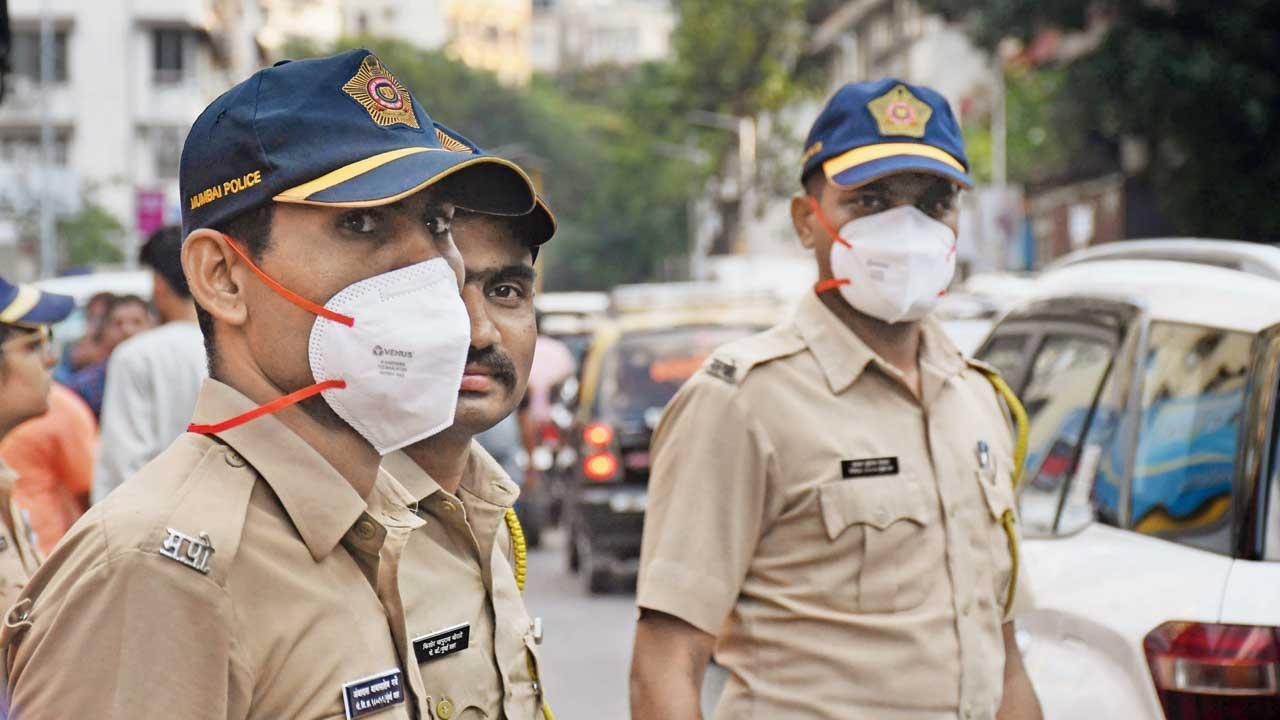Union Health Minister Mansukh Mandaviya tells states to review preparedness at district level; Maharashtra among eight states reporting high number of COVID cases

Police constables wearing masks during bandobast in the city on Thursday. Pic/Ashish Raje
State-run JJ hospital has announced drills of infrastructure next week to deal with the COVID-19 surge, as instructed by the Centre on Friday. Union Health Minister Mansukh Mandaviya held a meeting with all states and Union territories and asked to identify emerging hotspots, increase testing and infrastructure for COVID-19/influenza and expedite whole genome sequencing.
ADVERTISEMENT
At the meeting, also attended by Maharashtra Health Minister Tanaji Sawant and senior officials, Mandaviya asked everyone to review preparedness at the district level on Saturday and Sunday. The drills will be conducted on April 10 and 11.
 An individual is tested for COVID-19 at Mahim on September 18, 2020. File pic
An individual is tested for COVID-19 at Mahim on September 18, 2020. File pic
Maharashtra is among the eight states, including Karnataka, Kerala, Delhi, Himachal Pradesh, Tamil Nadu, Delhi and Haryana, reporting a high number of cases. Some districts in these states have a positivity rate of 10 per cent and some over 5 per cent.
Public awareness
Also read: Mumbai: Hospitalisations due to COVID crosses 100-mark
Mandaviya advised enhancing public awareness campaigns regarding adherence to COVID-appropriate behaviour, like wearing of masks in public places and hand hygiene. He suggested that the respective health ministers personally monitor logistics and infrastructure, including availability of sufficient hospital beds and essential medicines.
The minister has advised increasing the rate of testing from the current 100 tests per million. The share of RT-PCR tests should be increased significantly, he said. He also asked states and UTs to monitor cases of influenza-like illness and severe acute respiratory infection cases, too.
XBB.1.16 prevalent
The nationwide tally of COVID-19 cases rose significantly from average 571 cases daily in the week ending March 17 to 4,188 a day in the week ending April 7.
He said that the World Health Organisation is closely tracking one variant of interest—XBB.1.5, and monitoring six other variants—BQ.1, BA.2.75, CH.1.1, XBB, XBF and XBB.1.16. Omicron and its sub-lineages continued to be the predominant variant, most of the assigned variants had little or no significant transmissibility, disease
severity or immune escape, he added.
The prevalence of XBB.1.16 increased from 21.6 per cent in February to 35.8 per cent in March. However, no evidence of an increase in hospitalisation or mortality has been reported, the minister said.
4,188
No. of daily COVID cases in India in past week
 Subscribe today by clicking the link and stay updated with the latest news!" Click here!
Subscribe today by clicking the link and stay updated with the latest news!" Click here!







